In the cold, objective language of news reports, wars are often reduced to grim statistics and headlines that chronicle the death toll, devastation, and the millions of shattered lives left in their wake. Yet, hidden behind these stark accounts are the stories of countless individuals, each with their own dreams, aspirations and unique narratives. It is a poignant reminder that behind the impersonal numbers are lives. Human lives, ruined by the Russian invasion of Ukraine.
I’m very grateful that I can show you an often overlooked perspective on the war other than that presented through the lens of the news media, where the tragedy of war is often rendered faceless and soulless. The war consists of millions of deeply personal and tragic stories of real people.
The article below was written by Oksana Kovalenko and Kateryna Kobernyk of the Ukrainian Babel, and the story they’ve chosen to tell is heartbreaking. However, stories like this one have become commonplace in today’s Ukraine.
***

(Photos: Dmytro Smolienko)
On 6 July 2023, 38-year-old former prisoner of war Olya Morokhovska hugged her children Rinat and Varya for the first time in more than a year. Russia had illegally detained them for 15 months in the occupied east of Ukraine. The last time Olya saw her children before that was on 28 March 2022, in her native city of Mariupol. Rinat was four, and Varya was eight. Under constant fire, Olya gathered them and evacuated them together with her mother-in-law, but she was immediately captured. Little did she know then that the war would maim or destroy three generations of her family. The Russians killed her husband, Yaroslav, shot his father, starved her mother, and tortured Olya herself.
Olya returned to Ukraine in October 2022 — she was exchanged together with 107 other captive women. After that, she did everything to see her children again. Now they are together again — in another city, in someone else’s apartment, without a father. They remember how to live as a family and speak Ukrainian. Babel correspondent Oksana Kovalenko spent a day with the Morokhovsky family shortly after their reunion. She tells the story of the family that the Russians mutilated but did not defeat.
***
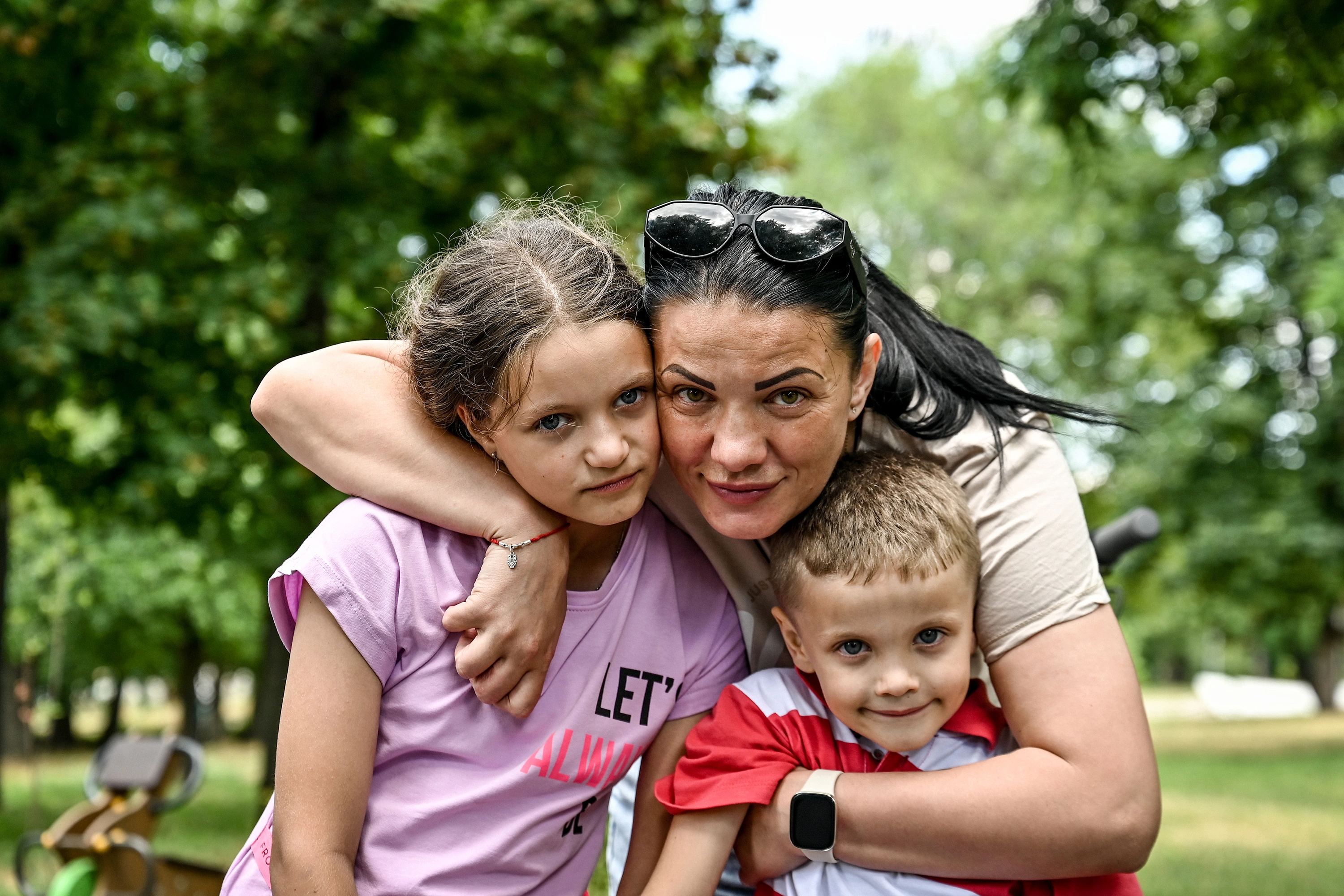
At 10.20am on July 12, the photographer and I are standing at the door of an apartment in a small three-storey building in the western part of the Dnipro. We have chocolates for the children and a cake. We knock on the door, and a child’s voice asks: “Who’s there?”, then — silence. Olya does not answer the phone. We wait for half an hour, knock on the door again and call. This time, Olya picks up the phone and runs to open the door.
“After returning, the children’s schedule got messed up: they go to bed late, and we sleep in in the morning,” explains Olya and apologises once again. Much has changed in their lives.
Olya was born and lived in Mariupol until 2022. She left for a long time only once — to go to Novosibirsk to study nursing. Olya’s aunt lived there. After returning home, she got a job with an ambulance crew. Later, she met Yaroslav, who was two years younger than her. They got married 14 years ago. Yaroslav served in the Marines — in the 503rd Battalion. They had two children at home in Mariupol: Varya was born in 2013 and Rinat in 2017.
After maternity leave, in 2021, Olya served as a military medic in the 21st separate motorised infantry battalion Sarmat of the 56th Brigade.
“We always allowed [the children] everything. We did it because no one knows what awaits them in the future,” says Olya. Now these words carry a deeper meaning.
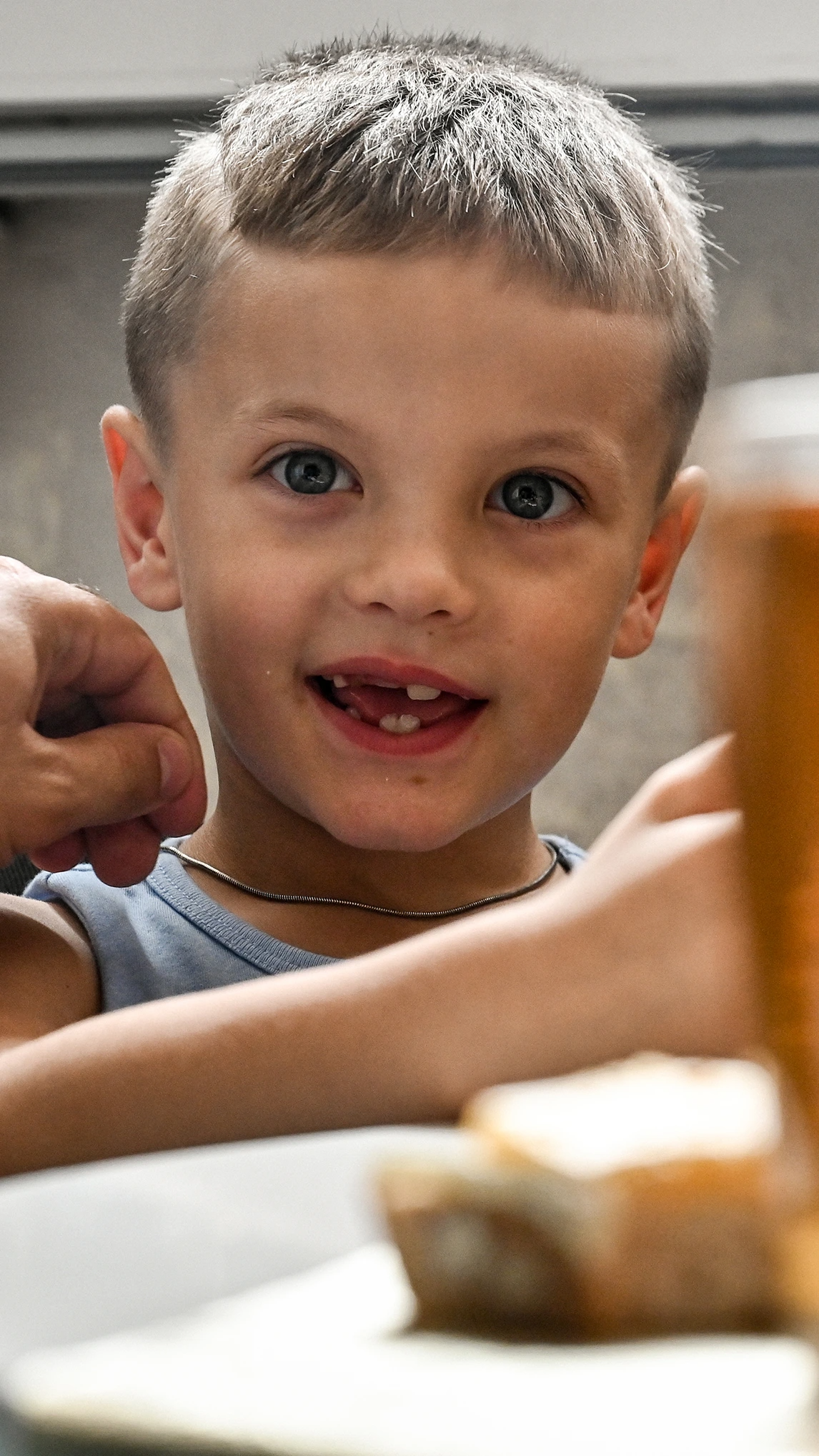
“When the children first came here, they were very happy that there was a lot of white in the apartment,” says Olya. “I was specifically looking for such a one. [We have had enough of the colour black]. We have suffered enough.”
Her 10-year-old, Varya, comes into the room. She has blue eyes and long wavy hair. Six-year-old Rinat has the same colour eyes. He recently lost his first milk tooth.
“For my daughter, when her milk teeth fell out, the tooth fairy always brought something under her pillow. And Rinat’s teeth fell out without me,” Olya says sadly.
We give chocolates to Rinat. He joyfully grabs them and yells to his sister that we brought sweets for her too. The children lie down on the bed, unwrap the sweets and focus on their devices.
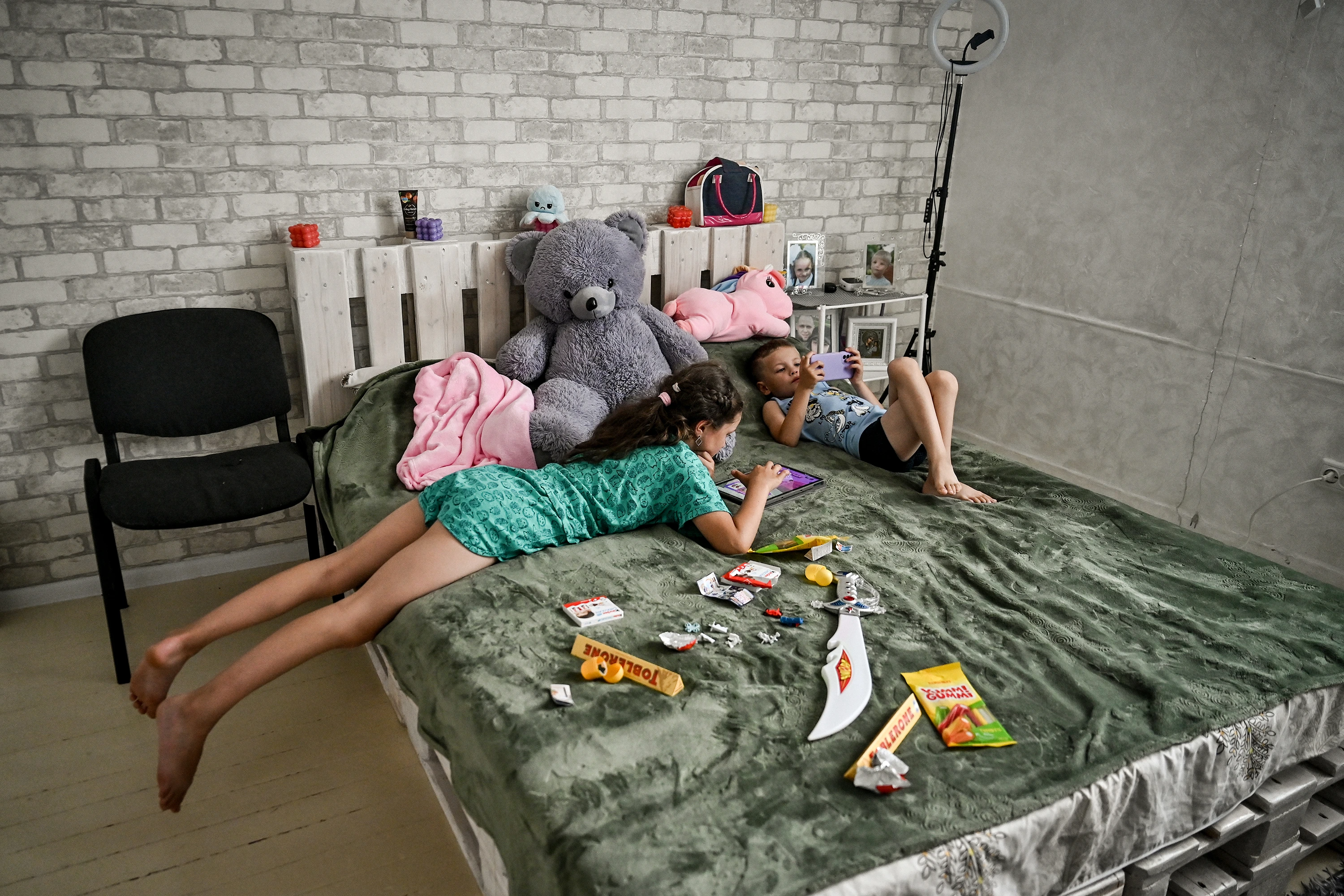
While the children are busy, Olya recalls 24 February 2022. The day before, Yaroslav had returned to Mariupol. After the first explosions at 3.30am, both were called to their units. They kissed the children and left. Varya was eight, Rinat was four, he was just starting to speak. Olya’s 75-year-old mother, Zinaida, remained with the children.
Olya and Yaroslav were not released from their units for two days. On February 26, they returned home and took the children to Yaroslav’s father, who lived with his wife — Yaroslav’s stepmother — in a large private house with a deep basement. Within an hour, there was a missile strike near Olya and Yaroslav’s apartment, where Zinaida was staying. She was concussed, and emergency workers carried her away. The elderly woman was temporarily sheltered in the church.
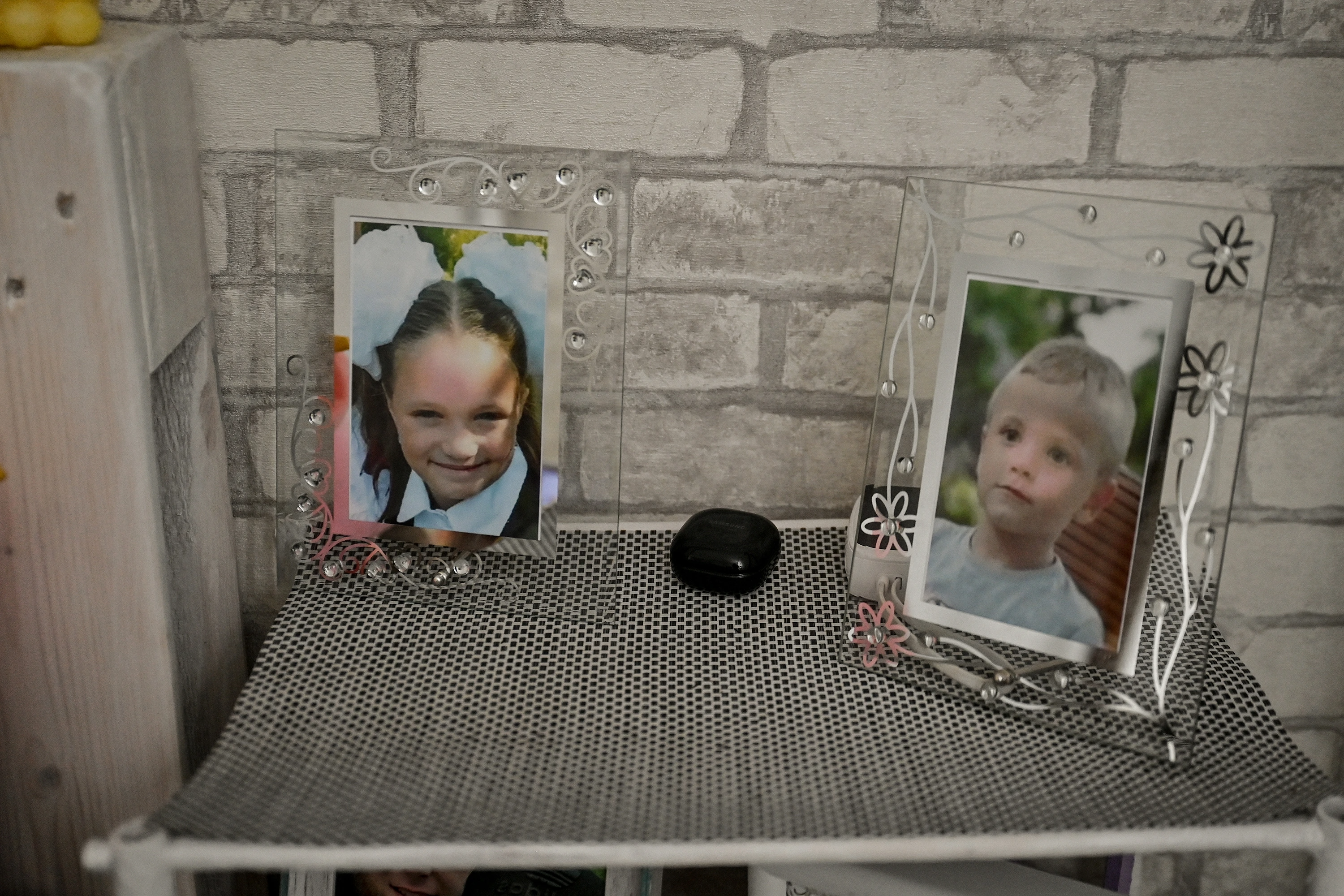
At first, Olya and Yaroslav were able to visit the children every day, but later less frequently. From March 10 to 28, they saw them only once. The internet connection no longer worked and they couldn’t phone them. Yaroslav asked Olya to go to the children and take them to a safe place. Yaroslav’s father refused to leave, saying that he would wait for everyone at home. His stepmother decided to go to Greece and agreed to take the children with her.
‘They started shooting at the car’
The only more or less safe way out of the city lay through the village of Bezimenne. There they had to undergo “filtration”. Olya said goodbye to the children and went back to the factory where her unit was stationed. On the way, at a checkpoint, she saw soldiers in national guard uniforms and a Ukrainian military uniform. It turned out that they were disguised Kadyrovites (Chechens fighting on the side of Russia.)
“They started shooting at the car. I thought they were confused. When I got closer, I saw white bandages on them, but it was too late,” she recalls.
They grabbed Olya, called her a sniper from the Azov Brigade and hit her on the head with a rifle butt — blood gushed from the wound. Olha was brought to Bezimenne, where her children were supposed to be “filtered”.
Meanwhile, the border guards saw the surname “Morokhovsky” and refused to let the children through. Yaroslav’s stepmother went to Greece alone. The Russians first sent Varya and Rinat to a hospital in Donetsk and then to an asylum in Khartsyzk. Nobody, except Yaroslav’s stepmother, knew that the children remained in the territory occupied by the Russians.
From Bezimenne, Olya was sent to the Novoazovsk pre-trial detention centre, 45km from Mariupol. She and other Ukrainian soldiers were interrogated there. They were tortured with electric shocks for a day and a half. After that, Olya was brought to Olenivka, and on 5 May, she was transferred to the Donetsk pre-trial detention centre, where she was constantly beaten.
“I had bruises all over my body; they knocked out my kidney,” she recalls and adds that all the time she hoped that the children were safe in Greece.
On 5 June 2022, this hope disappeared. Olya was summoned for interrogation and shown documents containing all the data of her children, including a description of the clothes they were wearing when they last saw each other. Olya begged her interrogators to tell her what had happened to the children.
“And we have them! We raise them better than bastards like you. We give them the right upbringing, not yours, nationalist,” they answered her.
A tearful Olya was taken to a cell in the basement again. There were 22 women there, among them eight cooks from the Azov Brigade and two women from the Aidar Battalion. She spent half a year in a cramped cell, without any contact with the outside world, and without any information about her children.
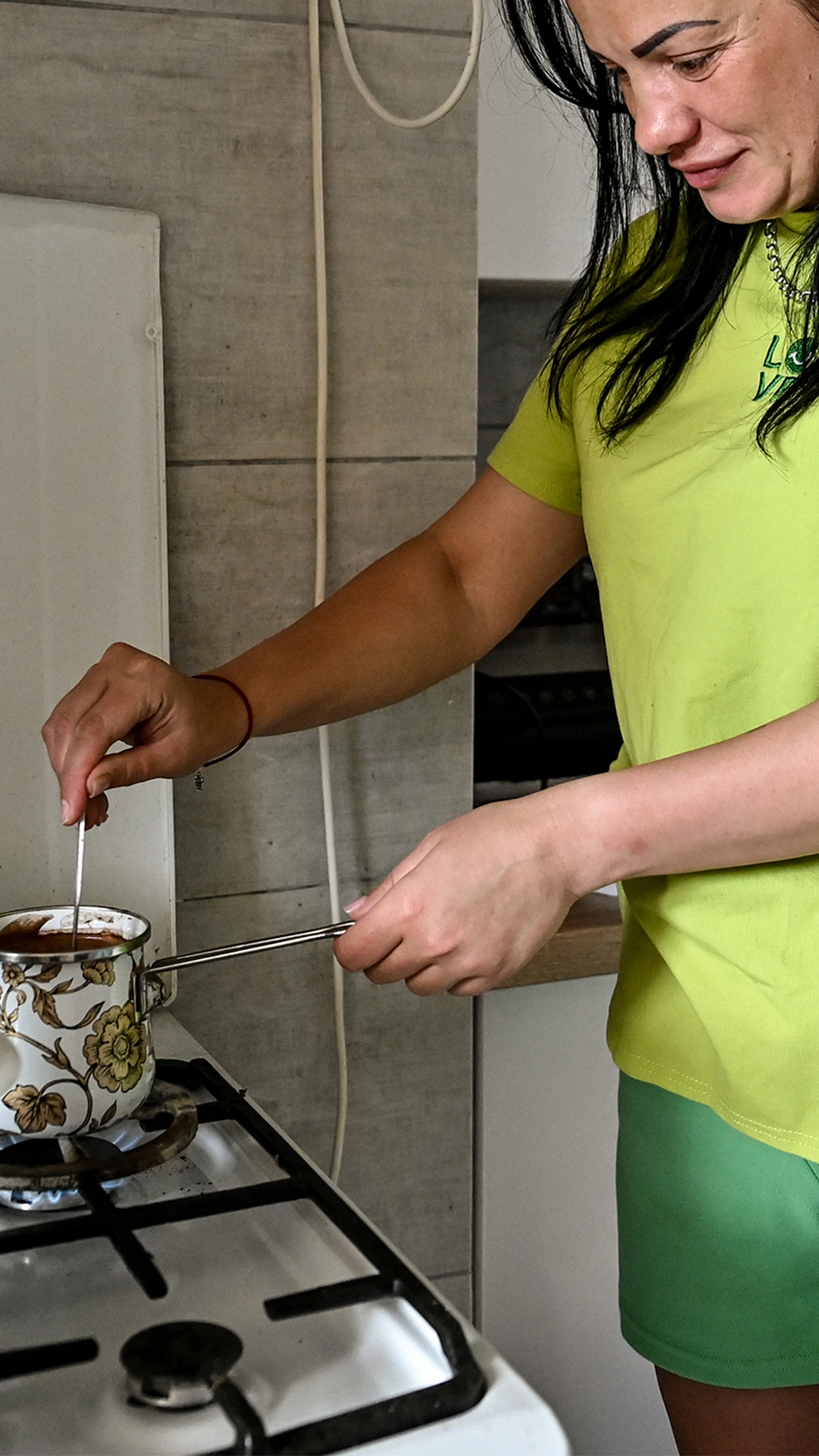
Olya tells us all these things while making coffee in the kitchen. We ask if she missed coffee in the pre-trial detention centre.
“Of course! We didn’t have coffee for seven months and constantly dreamed about it, chocolate and a cigarette. In captivity, they brewed some kind of ‘tea’ for us, but it stank. They put something there because all the women had a hormonal imbalance [after it].”
A new love
Andrii spends these days with Olya and the children. He is a military man, currently on leave. They met before the full-scale invasion and served in the same battalion. After she returned from captivity, he supported her constantly, called her, and on 14 February 2023, he confessed his love for her via SMS.
She did not respond then — she still had dreams about Yaroslav. And in one of these dreams, Olya says, he let her go, and then she agreed to meet Andrii. In March, he gave her a ring with the inscription “Always together” on it. She keeps it in a box.
“He looks partially like Yaroslav — both of them have beards and tattoos. Andrii treats children very well, and when Rinat saw him, it was love at first sight,” Olya recalls. Rinat quickly formed an attachment to Andrii. He sits next to him at breakfast and constantly tells him things.
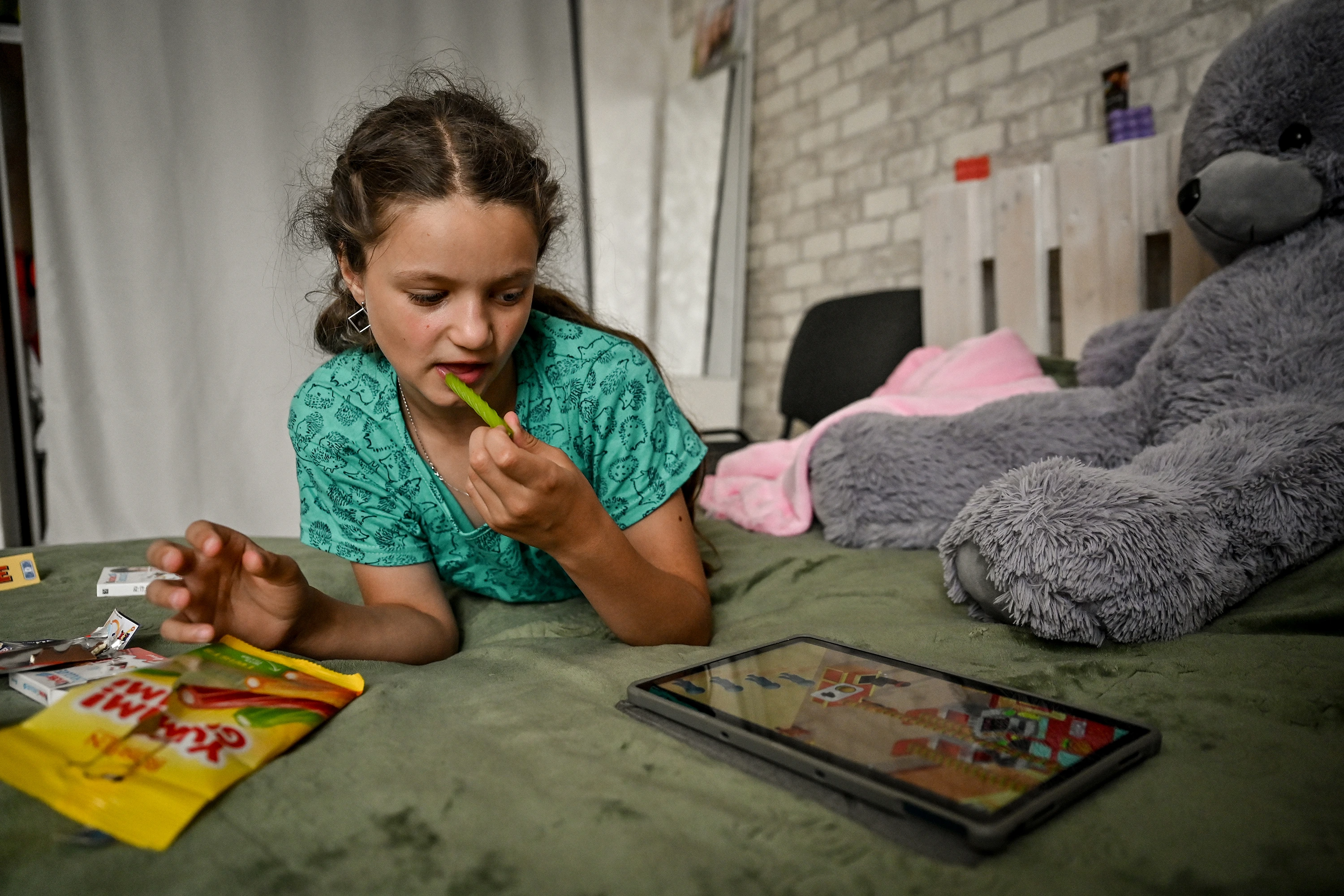
However, they do have a language problem when they communicate. Before the full-scale invasion, Varya spoke Ukrainian well, which she had learned at school. Rinat hardly spoke it at all. After a year and a half in the occupied territory, the children speak only Russian, and Andrii communicates in Ukrainian.
“In the first days [after returning], the children hardly understood him. They asked me: ‘Mom, what language does he speak?’. Now they’re used to it; they’ve recalled it,” says Olya.
She has dedicated a corner of the apartment to her late husband. There is a beret, a Marine flag and a bracelet. It was taken from Mariupol by his children when, together with his grandfather, they were able to get into the apartment under fire for the last time.
Yaroslav wore this bracelet as a talisman when he went on a military tour of duty.
“He always came back … and said that this bracelet saved him. And that time, we packed our things very quickly, and he didn’t put it on,” says Olya, her eyes filling with tears.
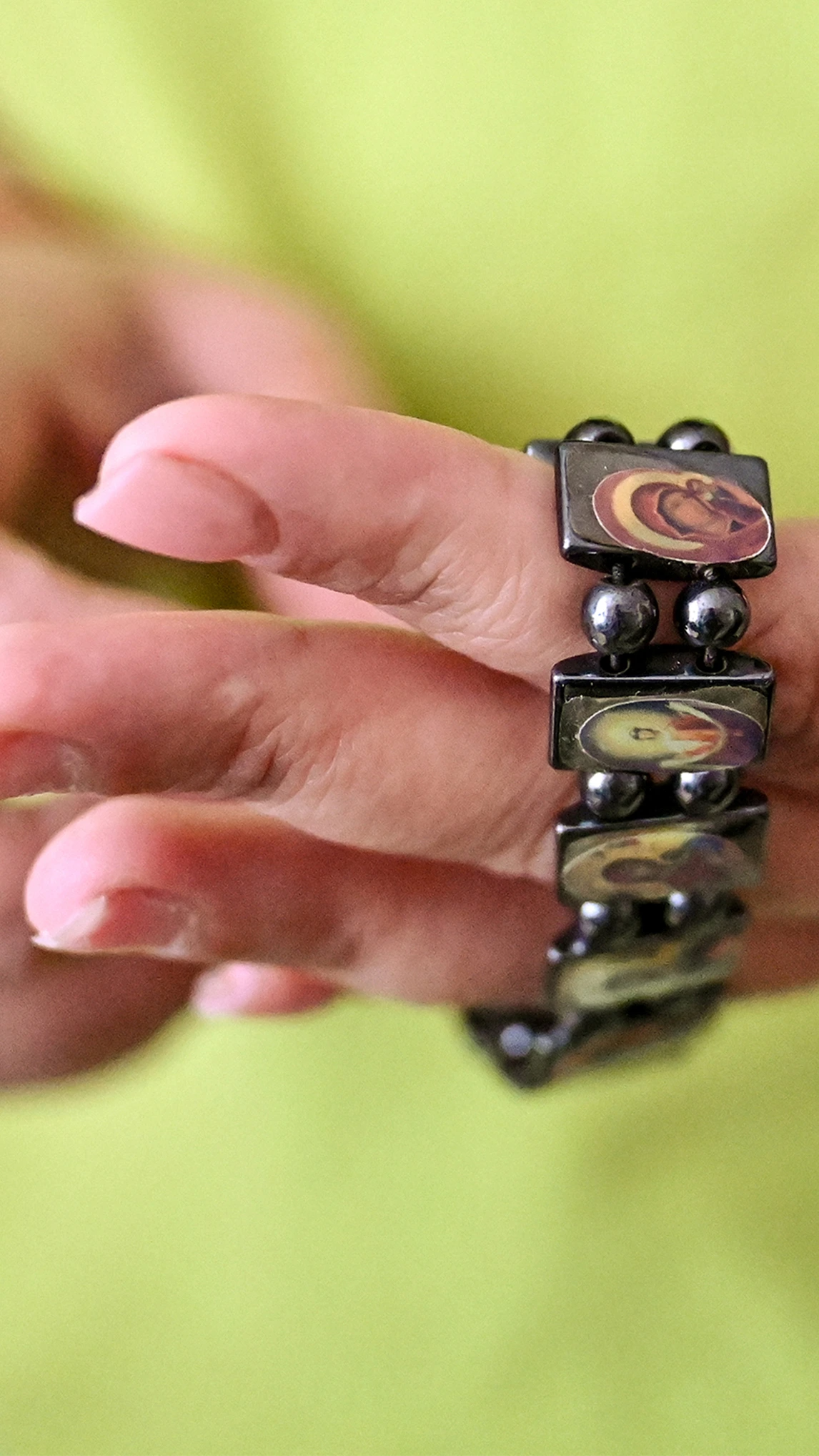
Yaroslav died on 20 April 2022 in Mariupol, when he was fighting at the Azovstal steel plant. The bracelet is almost the only thing of his that Olya has for now.
‘The Russians scattered his medals’
“Yesterday, my son asked me why there is not a single photo of his dad here. Photos of Yaroslav and me in uniform hung on the wall at our home. Varya says that they were all shot. The Russians sat there, cut his beret, destroyed his photo, scattered his medals — threw knives at them. In this corner of mine is all that is left of my husband. I talk to him every morning and every evening.”
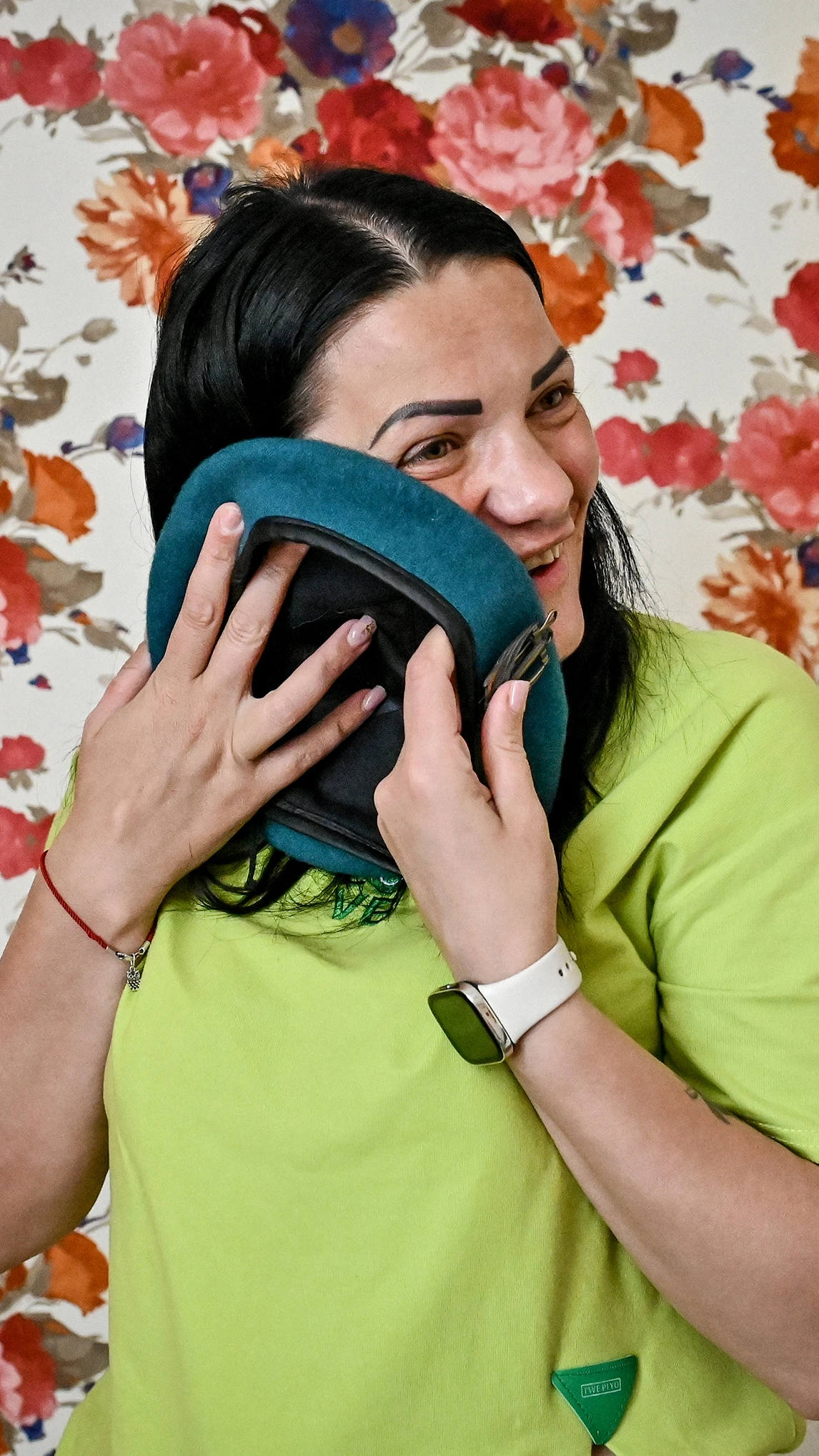
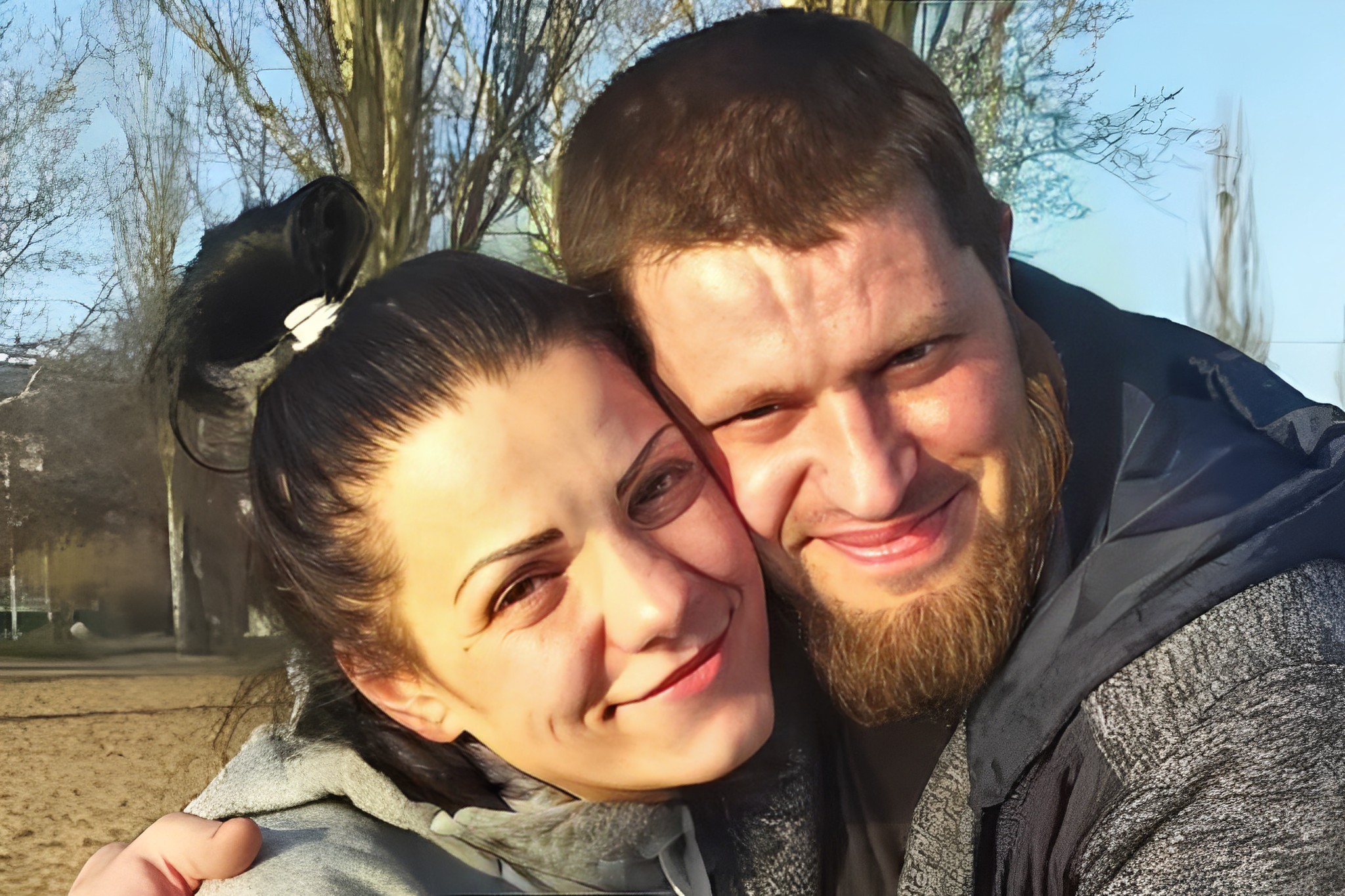
Yaroslav never found out that Olya had been captured. And when she was in captivity, Olya did not know that Yaroslav had died — she was sure that her husband was waiting for her in the Dnipro.
Yaroslav’s military comrades told her about his death when she returned from captivity. They sent her a photo showing several bodies lying on the ground. One of them was Yaroslav. The next day, the captain and major from her husband’s unit came to her and brought documents about his death.
“I shut myself down — the doctors put me on hydazepam [a tranquilliser],” Olya recalls.
She does not know where Yaroslav is buried. His body was exchanged and buried either in Kyiv or in the Dnipro. Olya decided that she would look for his grave when she returned to the children. Varya and Rinat found out about their dad’s death only a few days ago — they were told about it in the presence of psychologists.
We end the conversation and decide to go for a walk. Andrii says that the video in which Olya meets her children for the first time after their separation has gone viral. Now they are often recognised on the street. Because of this, they do not like to go to crowded places.
“Not even a week has passed. We want to be together as a family,” says Andrii. Rinat tugs at him every minute: sometimes he asks for help with his phone, sometimes with the internet, sometimes for advice on what to wear outside. An air raid alarm sounded on my phone, followed by a siren from the street. The children ignore everything.
“Do the children react to sirens?” I ask Olya.
“No, they don’t know what it is. There were no sirens in Mariupol. Yesterday, Varya was walking on the street with a girl, and I warned her, that if she hears a siren, she should immediately run home. And she asks: ‘Mom, what is this?’” says Olya.
Telegram channels report that the alarm was activated as a precaution — we are going for a walk.
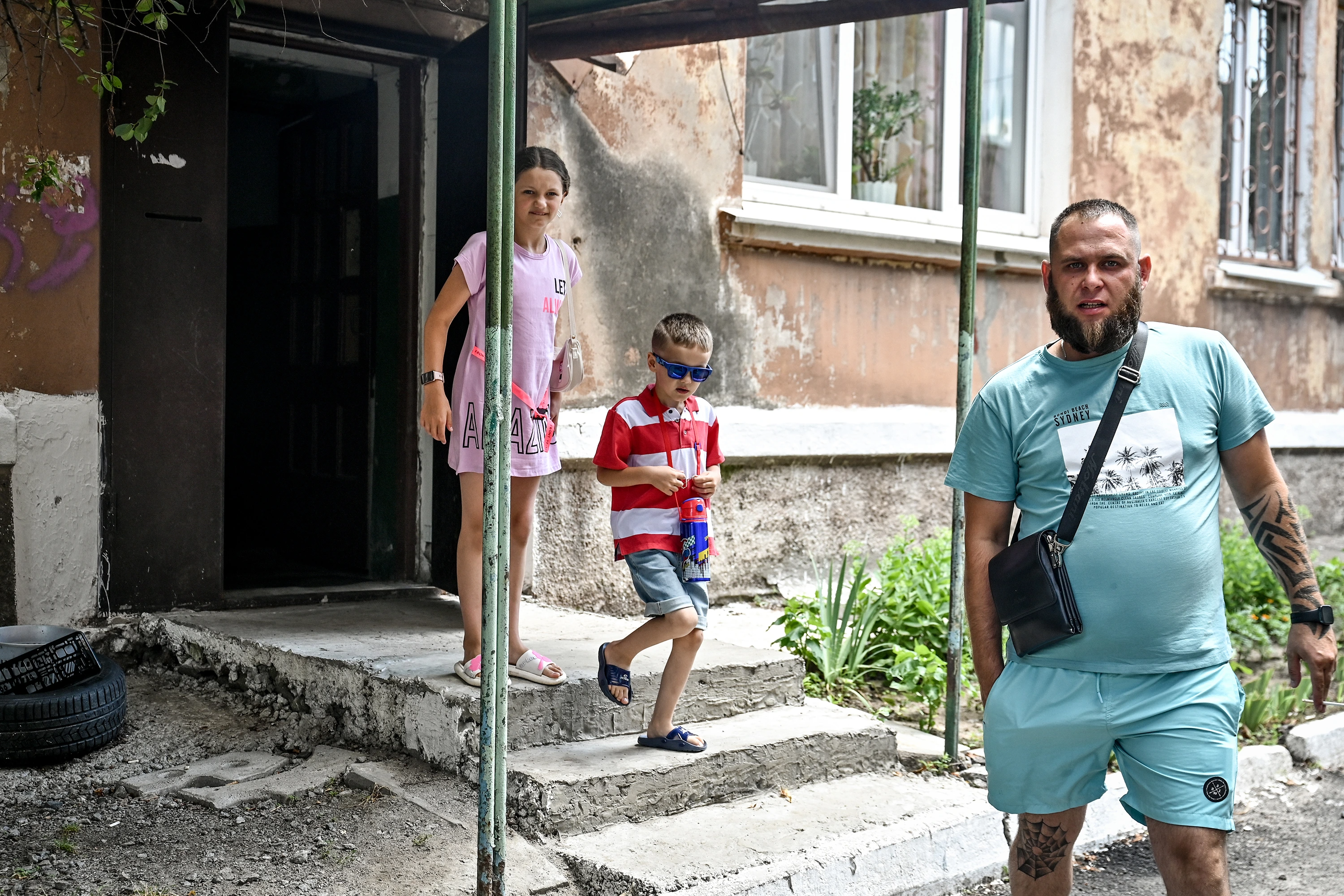
“When they [kids] returned, everything came to life for us,” Olya says. While I was alone, I thought I would lose my mind. I signed up for training [in the gym], but due to a concussion, sports are forbidden to me — I got sick in the gym. An ambulance was called.”
We arrive at Novokodatskyi Park, which the children love. There are horses and toy cars to ride.
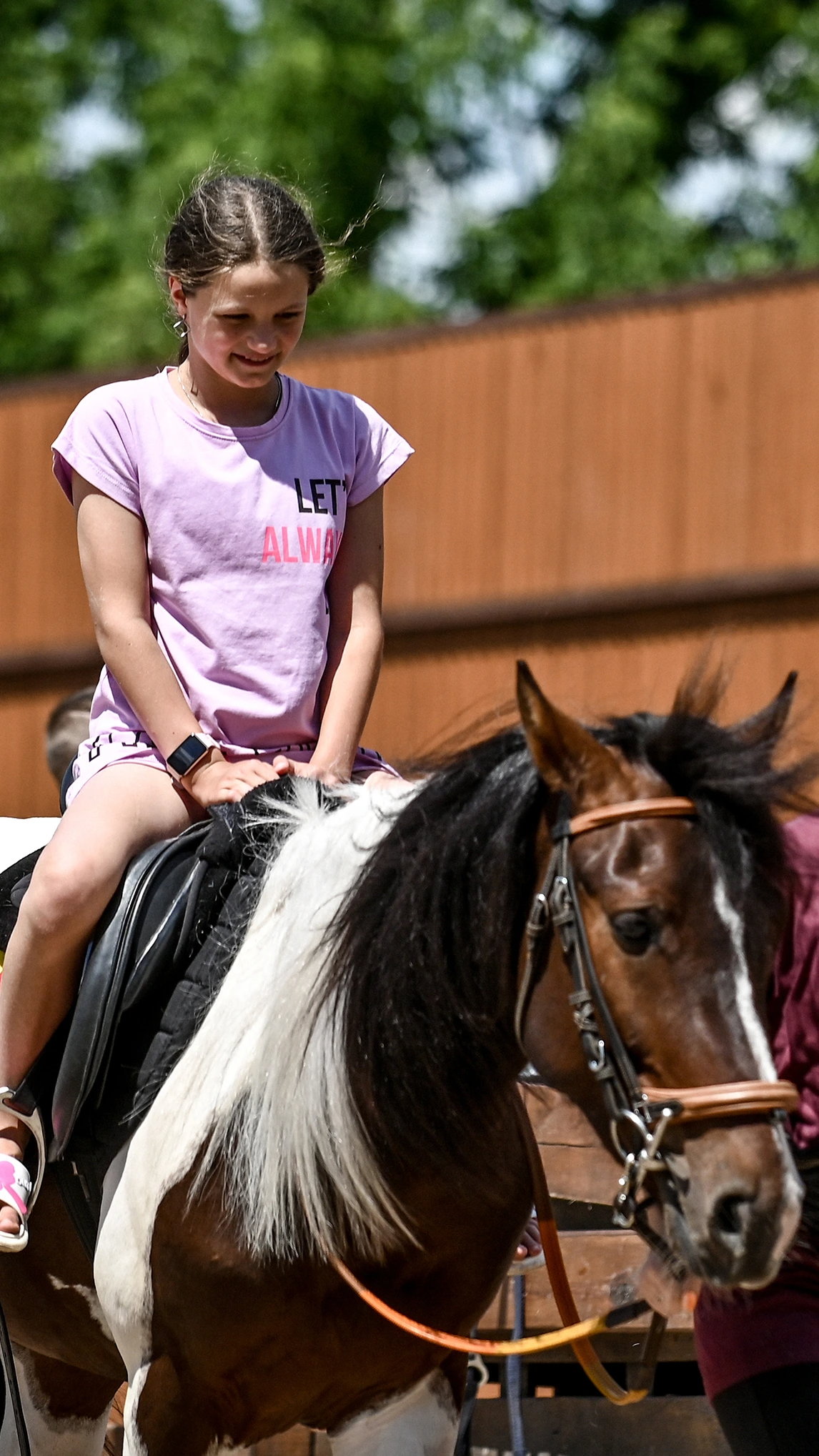
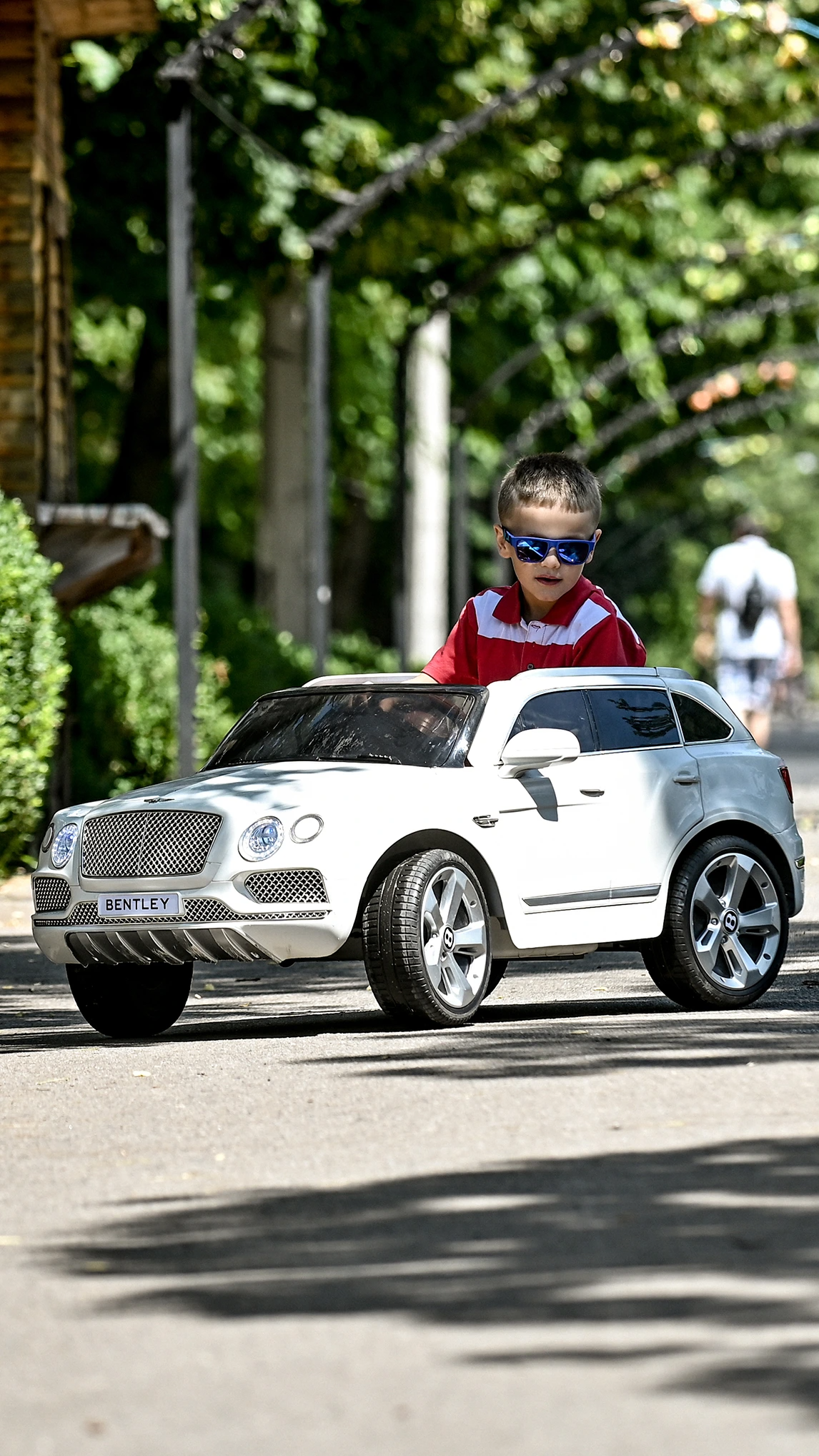
“The last year and a half had a great impact on Varya — she grew up quickly, partially being a mother to Rinat. After two weeks in the Donetsk hospital, the children were sent to a shelter in Khartsyzk and housed separately,” Olya says.
“They saw each other when they had meals and sometimes in the evening. Russians dressed them in old and ragged clothes, Rinat got clothes for girls. And Varya called her brother at night to comfort him when he was crying because of the bullying of other children. They said that Mom and Dad didn’t love him and he would stay in the shelter forever.
“Varya came, sat next to him, petted him, and was telling him: ‘Mom will pick us up soon.’ She cut her brother’s nails, cleaned his ears, and protected him from older boys who beat him. Sometimes she got beaten too.
“Rinat has become so attached to his sister that even in Dnipro he is constantly worried, and if Varya goes somewhere without him and does not return for a long time, he asks Andrii to seek her.”
The children’s great-grandfather Fedir, Yaroslav’s grandfather, took them from the orphanage. He stayed in Mariupol because his wife was ill, and he could not leave her. Fedir found out that the children were in the orphanage in April 2022, after the orphanage published a list of children in it.
Olya’s friends from Mariupol saw the list and Fedir drew up documents, but the matter dragged on, and he was given custody of the children only in December 2022.
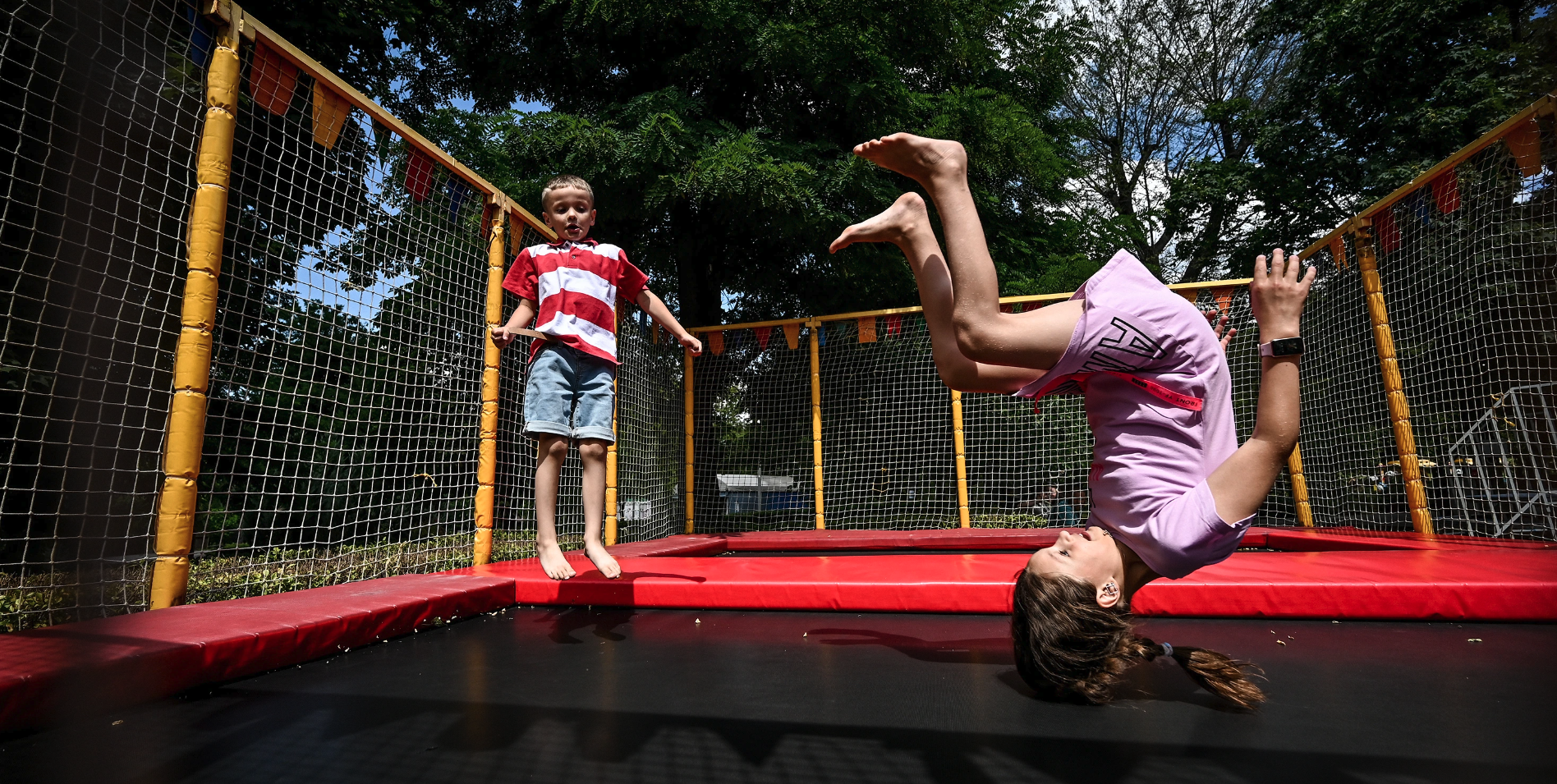
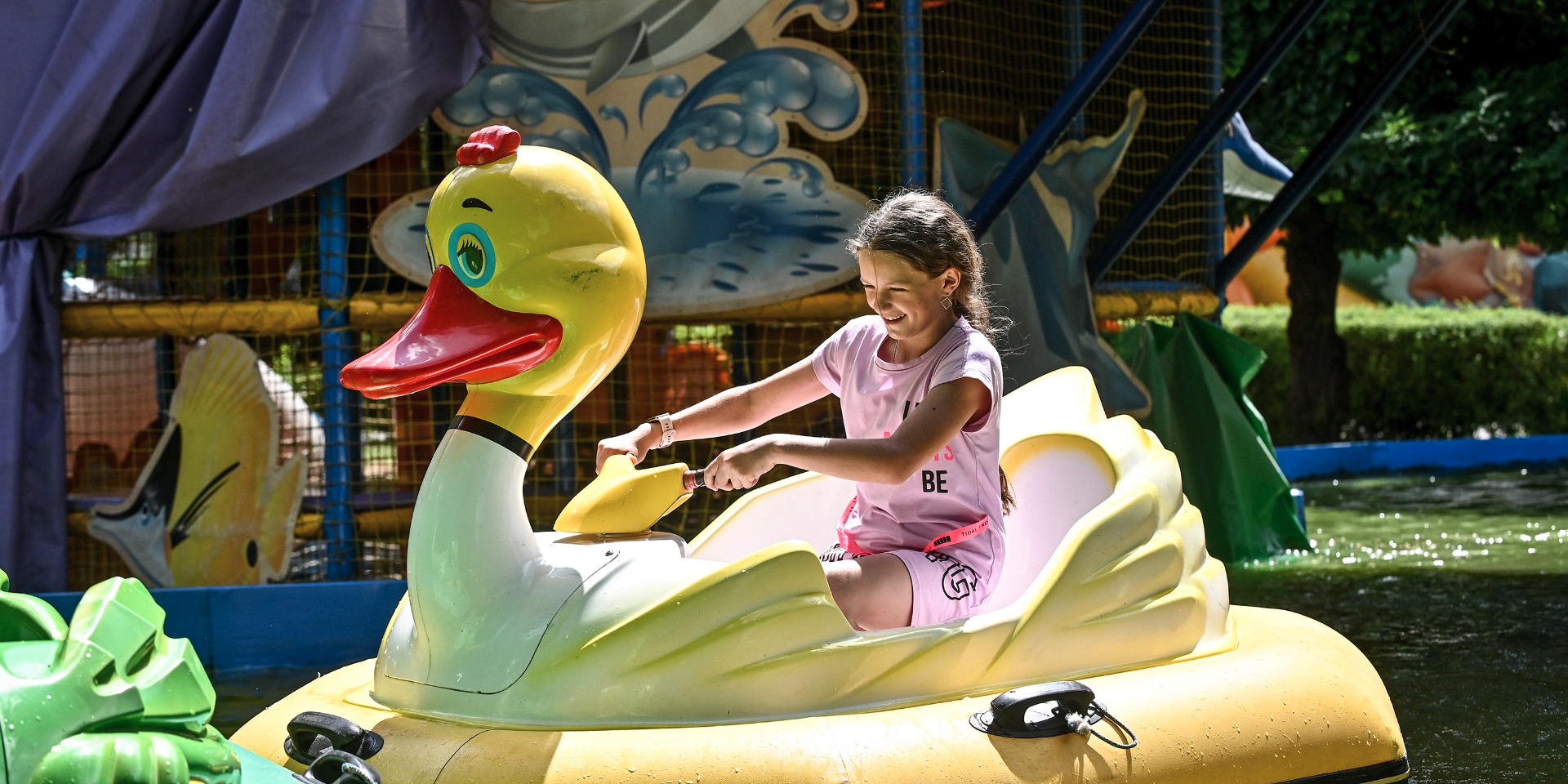
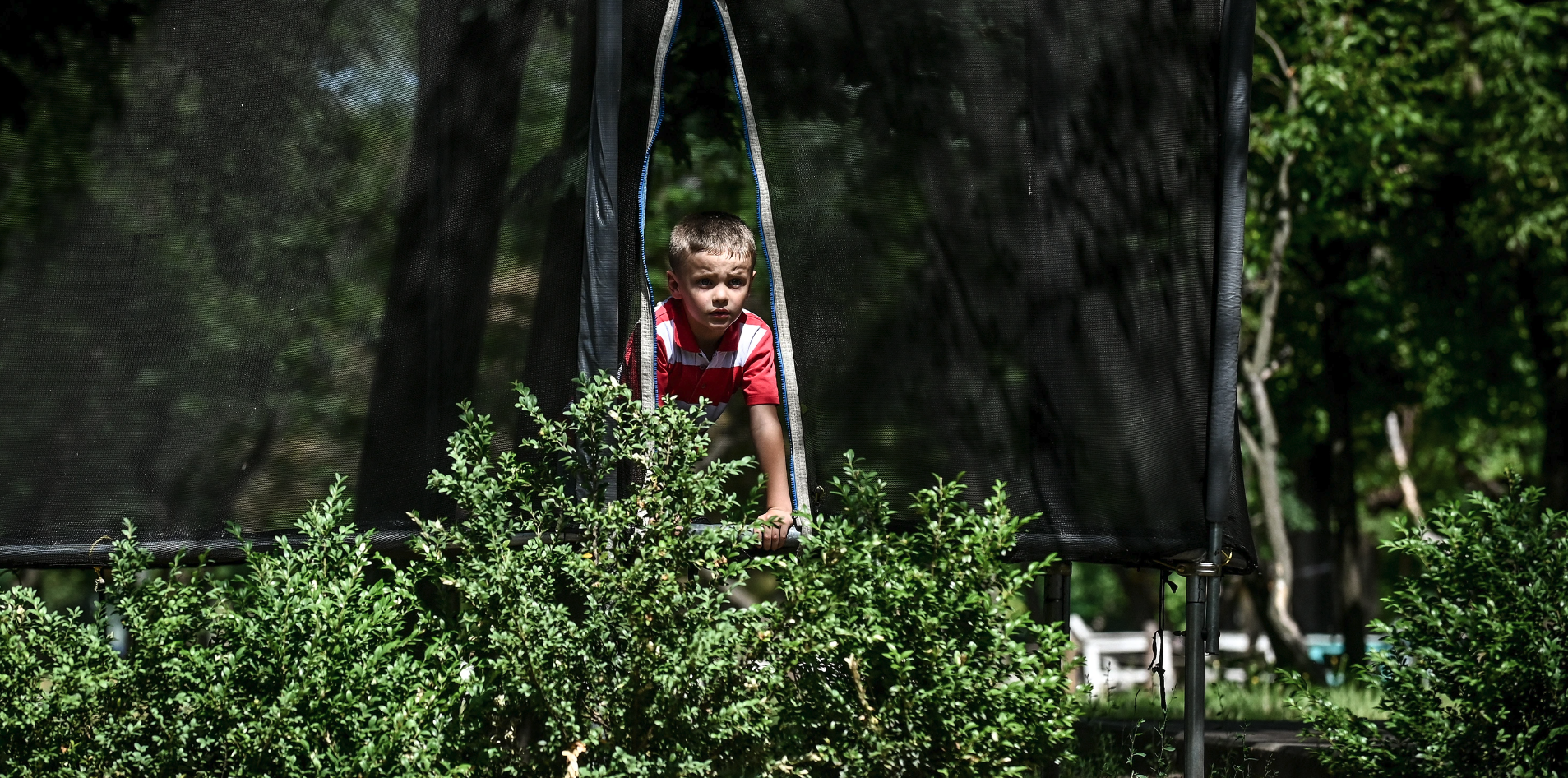
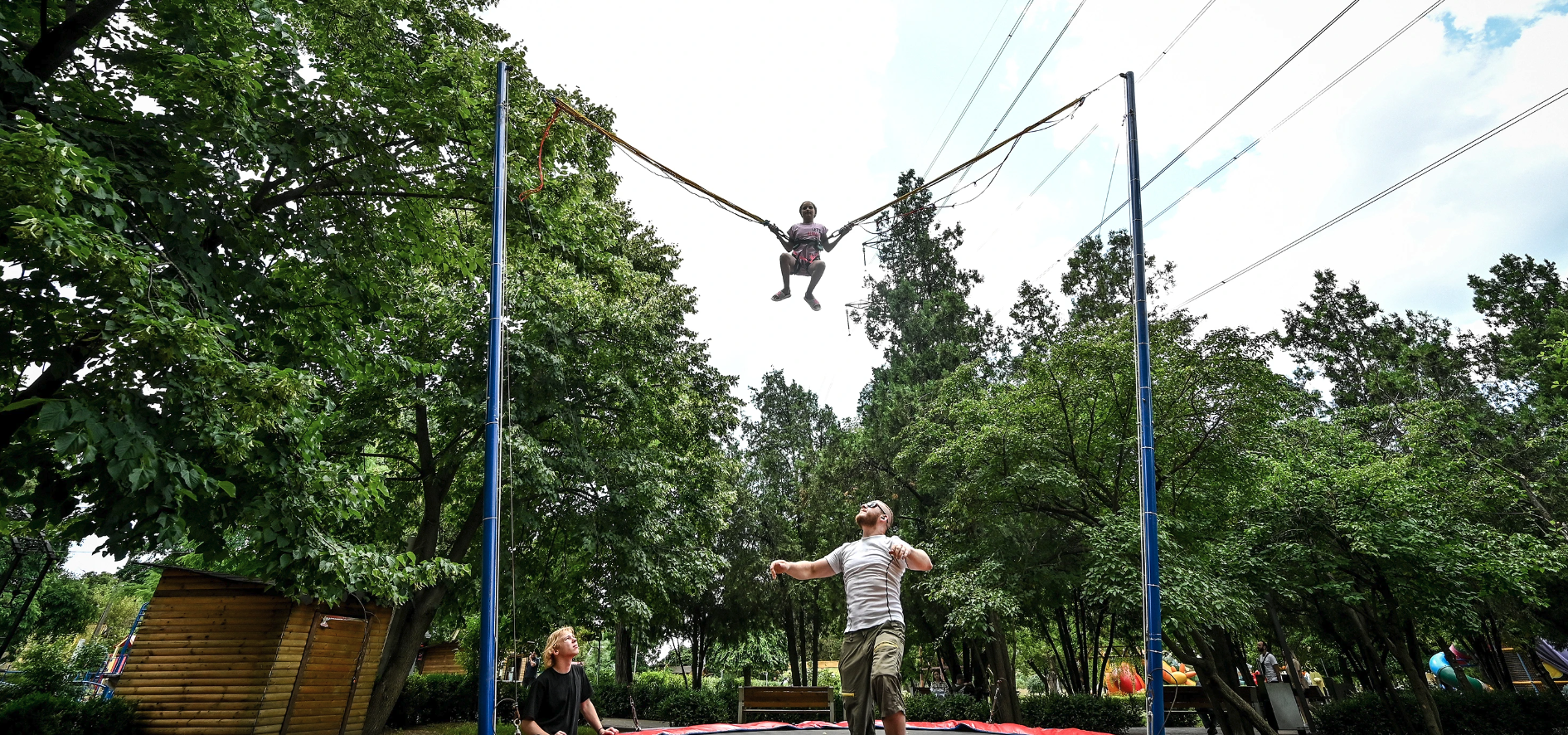
At the park, new entertainment is ahead — slingshots, trampolines, swans on the pond, slides. Andrii is next to the children, and Olya, while the children are busy, talks about her release.
‘The children were brought to me by ambulance’
“We drove for a very long time. I was so worried that I peeled off all the nails on my hand. We were brought to the border with the Belgorod region. And there the children were brought to me by ambulance.
“I can’t watch that recording [of meeting the children] — I start to cry. I saw nobody then, neither people nor cameras — nobody. I only heard the voices of my children: ‘Mom’. The main thing is that I needed to hug them.”
In the pre-trial detention centre, guards told Olya and other prisoners that Ukraine no longer existed and that Kyiv and Dnipro were occupied. A portrait of Putin was hung in the cell. The guards said: “If something happens to it [the portrait], everyone will be punished”.
Once, Olya killed a fly on the portrait – which was on Putin’s forehead – and everyone was so scared. The women were forced to sing the Russian national anthem, and Olya was constantly asked to take a passport of “DPR” or Russia, but she refused. When things got really difficult, the women prayed together.
On 17 October, they were blindfolded, their hands were tied and they were put in a vehicle and driven somewhere. At dawn, they were brought to an airfield and put on a plane that flew to Sevastopol. There Olya saw the women with whom she had been imprisoned in Olenivka and women from Russian Taganrog. No one knew (or explained) anything. But one of the guards whispered, “That’s it, you are going home.”
The women were exchanged in the Zaporizhzhia region. At the exchange, Olya kept repeating that her children were in Donetsk. She was brought to the representative of the ombud in the security and defence system, Oleksandr Kononenko. The Russian commissioner for human rights Tatiana Moskalkova was standing nearby. Kononenko gave his word that the children would be returned. Only after that did Olya agree to the exchange.
Moskalkova promised to return the children “soon”, but this was another lie — they were kept in the occupied territory for another nine months. The Russians wanted Olya’s relatives from Russian Samara to adopt them, and they demanded that she personally come to occupied Donetsk to pick up the children.
Already in Dnipro, Olya learned about the fate of her mother and Yaroslav’s father. After the Russians captured Mariupol, 75-year-old Zinaida was sent to a home for the elderly in Khartsyzk. Many months later, her son, Olya’s brother, who moved to Russia 18 years ago, took her from there. He was not allowed to take his mother out for a long time.
“Mom stayed in that asylum even longer than my children in the boarding school,” says Olya. “She lost a lot of weight, she was hardly fed there. The first thing she said to her brother was ‘[I want] to eat’. Against this background, she also experienced a microstroke.”
Yaroslav’s father, who stayed at home in Mariupol to wait for his son, Olya, and his grandchildren, was shot by the Russians. He had hidden Azov soldiers in his basement.
“Neighbours say that at first, he was beaten very hard, he screamed so badly. And then they [occupiers] shot him. And they threw grenades into the basement, where the Azov soldiers were,” Olya says.
While she is talking, I look at her left arm, where she has a tattoo of a woman and two children. “I made it immediately after the capture. This is me, my daughter and son. When my children and I were able to communicate, I showed them the tattoos and told them that they were now always with me on my body.”
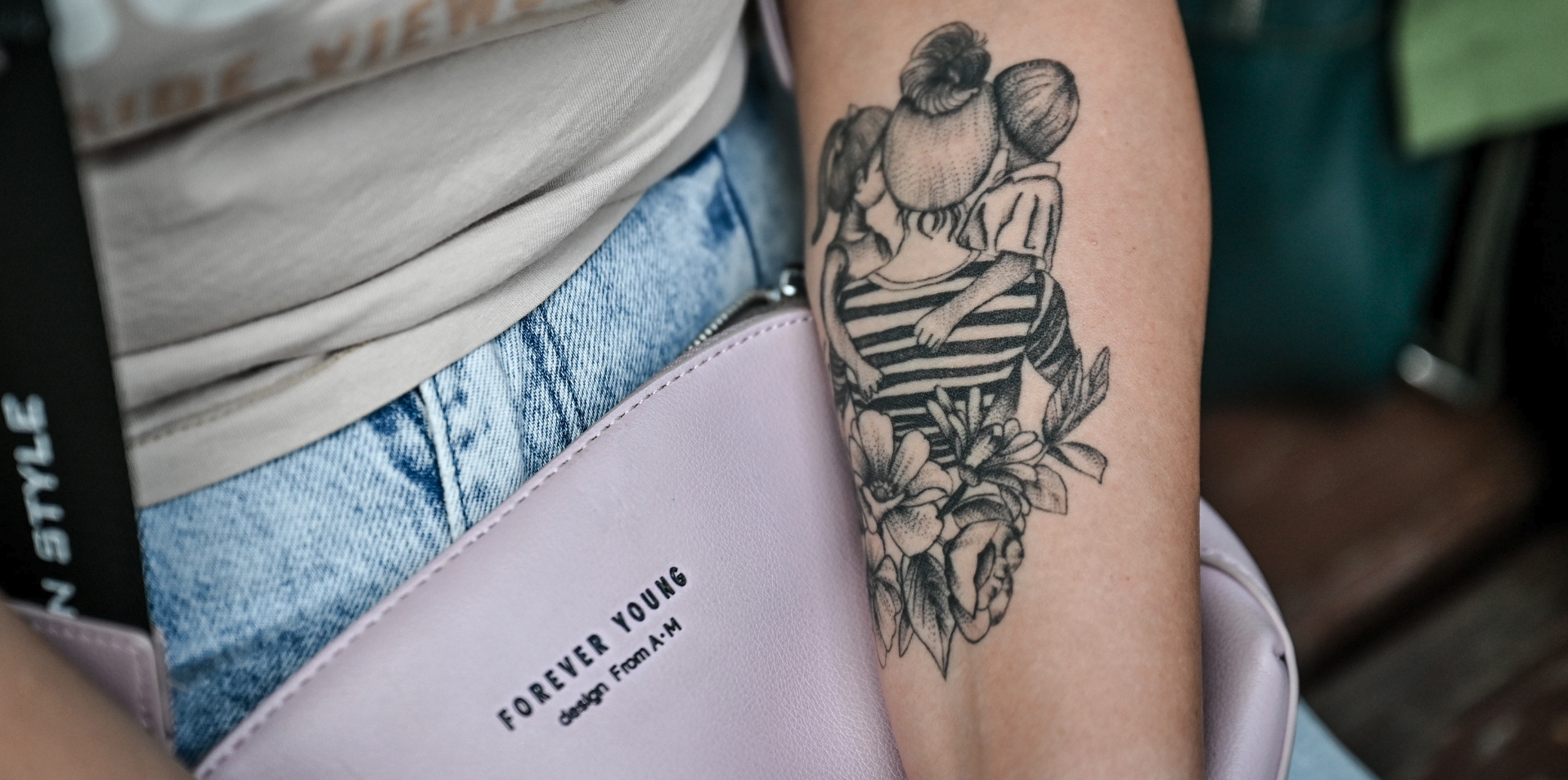
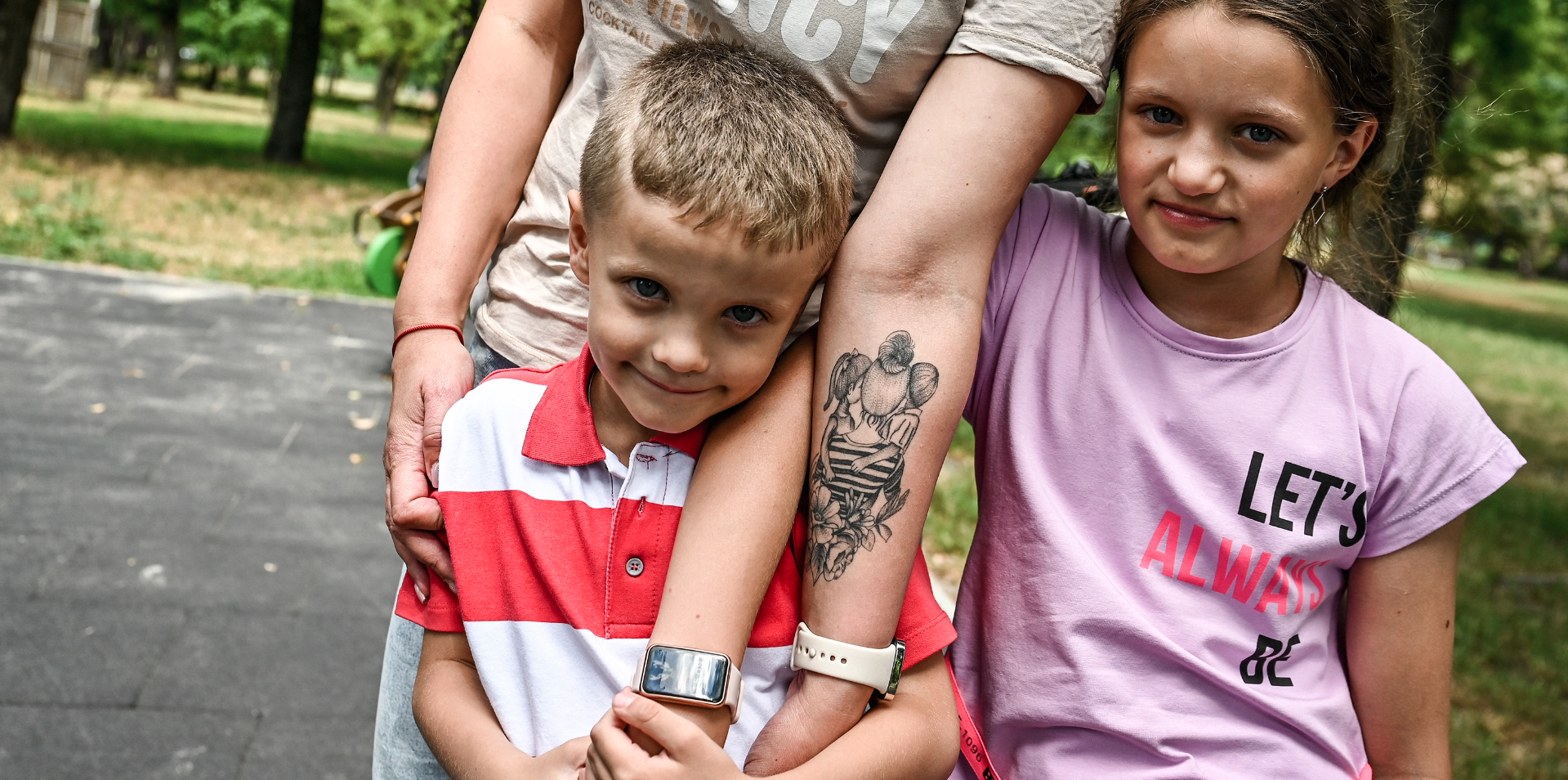
We eat in a fast-food restaurant and the children tell us how they lived during the occupation and helped their great-grandparents in the household. When we return to the apartment, I ask Varya what she was taught at [boarding] school.
“We had the Russian language, literary reading, and mathematics, as well as the English language and art. Several other children from Mariupol studied with us,” she says.
“And what poems did you learn?”
“About Rus’ [Kyivan Rus’], but I don’t remember which ones.”
“What did you do while drawing?”
“Sometimes, we paint fruits, then winter. On March 8, we drew mothers. I was painting you, Mom” she told Olya, who was sitting next to her on the bed and listening. “And we also painted a ribbon of Saint George for May 9. The whole class was given badges — there was a ribbon and some man.”
There was more propaganda in the orphanage in Khartsyzk. There they played the Russian national anthem every morning, and all the children had to listen to it standing up. Russian flags were everywhere. The children lived there until the beginning of July.
On the eve of their return, on 5 July 2023, Oleksandr Kononenko called Olya and asked her to come to Kyiv. He did not explain why. She arrived, stayed in a hotel, and on the morning of 6 July, she and Andrii were picked up by a minibus and taken somewhere. Only then was she told that they were going to fetch the children.
I ask the children if their mother has changed. Rinat says no. Varya says that she has become older and gained a little weight, apparently from the hormonal drugs which the women were given in captivity.
Now that the children are at home, Olya will look for Yaroslav’s grave. She also plans to buy a house. Then it will be possible to get a dog — which is what Varya dreamed about even before the full-scale invasion. Recently, at a meeting with a psychologist, she said that she wanted an Alabai (also known as a Central Asian shepherd dog) because such a dog can protect her from bad people.
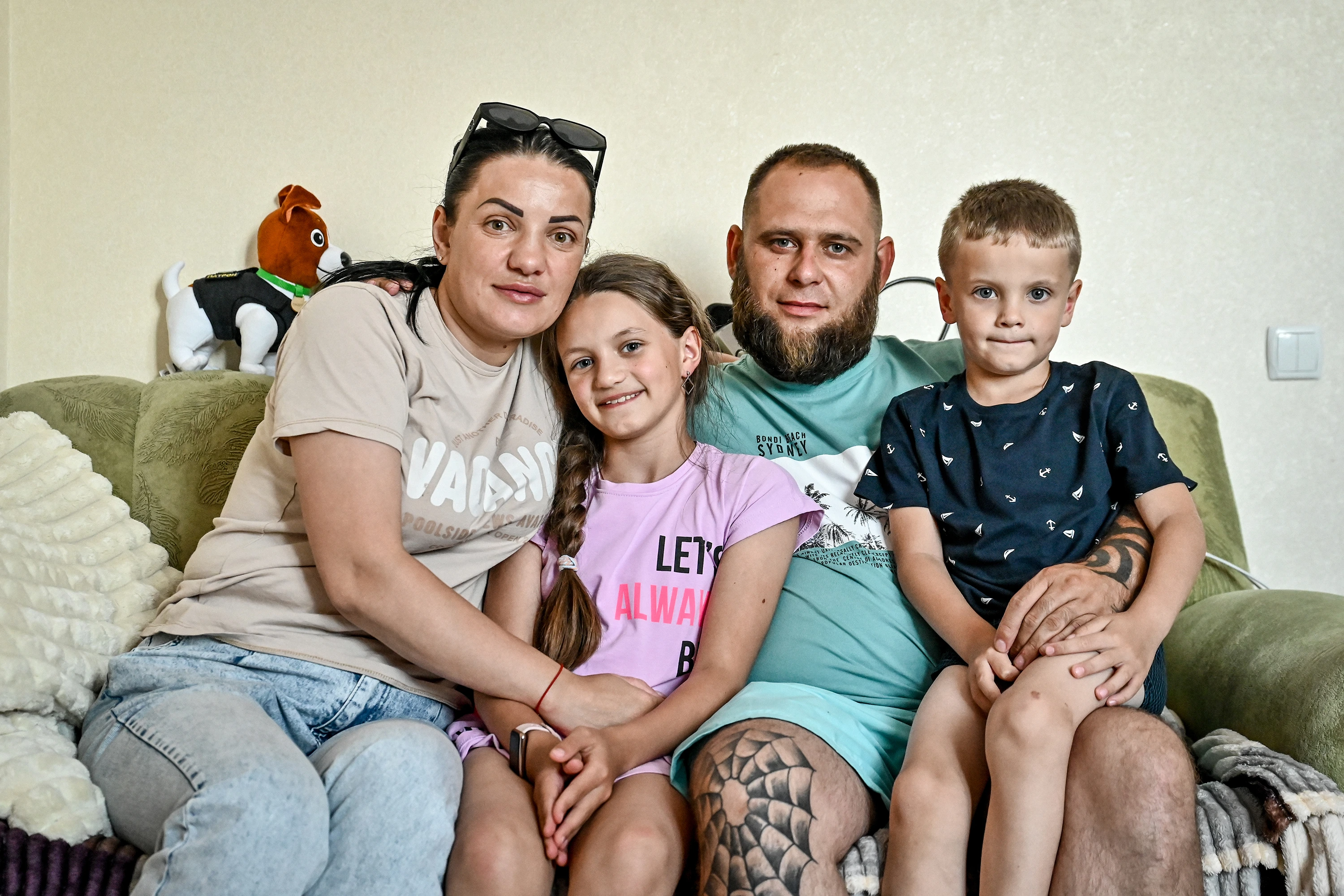
Another task for Olya is to get the children into school. All their documents are in Mariupol. In addition, Varya studied for a year under the Russian programme and does not speak Ukrainian. It’s time for Rinat to go to First Grade. But Olya is not sure whether to do it now, she wants to discuss it with a psychologist.
By now, the children are tired of attractions and the constant attention of strangers. It’s time for us to leave. I ask Rinat what he wants to be when he’s big.
“I want to be a policeman and make sure that no one breaks the rules. Or a military one,” he answers.
“Not a military one, it’s very dangerous!” Varya says.
Rinat wears a toy military helmet and bulletproof vest.
“Glory to Ukraine!” Andrii tells him.
“Glory to heroes!” Rinat replies. DM















Thank you Mrs. Ambassador for keeping us up to date on the real suffering and pain in your country. My heart bleeds for your nation and I cannot wait for the day when you will be free, sovereign, democratic and be able to chart your own course. At the same time, I have nothing but deep hatred, utter revulsion and total contempt for the bestial and evil Putin monster and devil, including the odious Kremlin and minions. That vile nothing-nik is a coward and a bloodthirsty murderer who deserves to burn in hell forever more. I and many others will celebrate his death and hope it is a slow, painful and lingering death for all the hundreds of thousand he that has murdered, tortured, raped, kidnapped and destroyed. GOD BLESS UKRAINE – SLAVA UKRAINA!!!!!!!!!!!!!!!!!